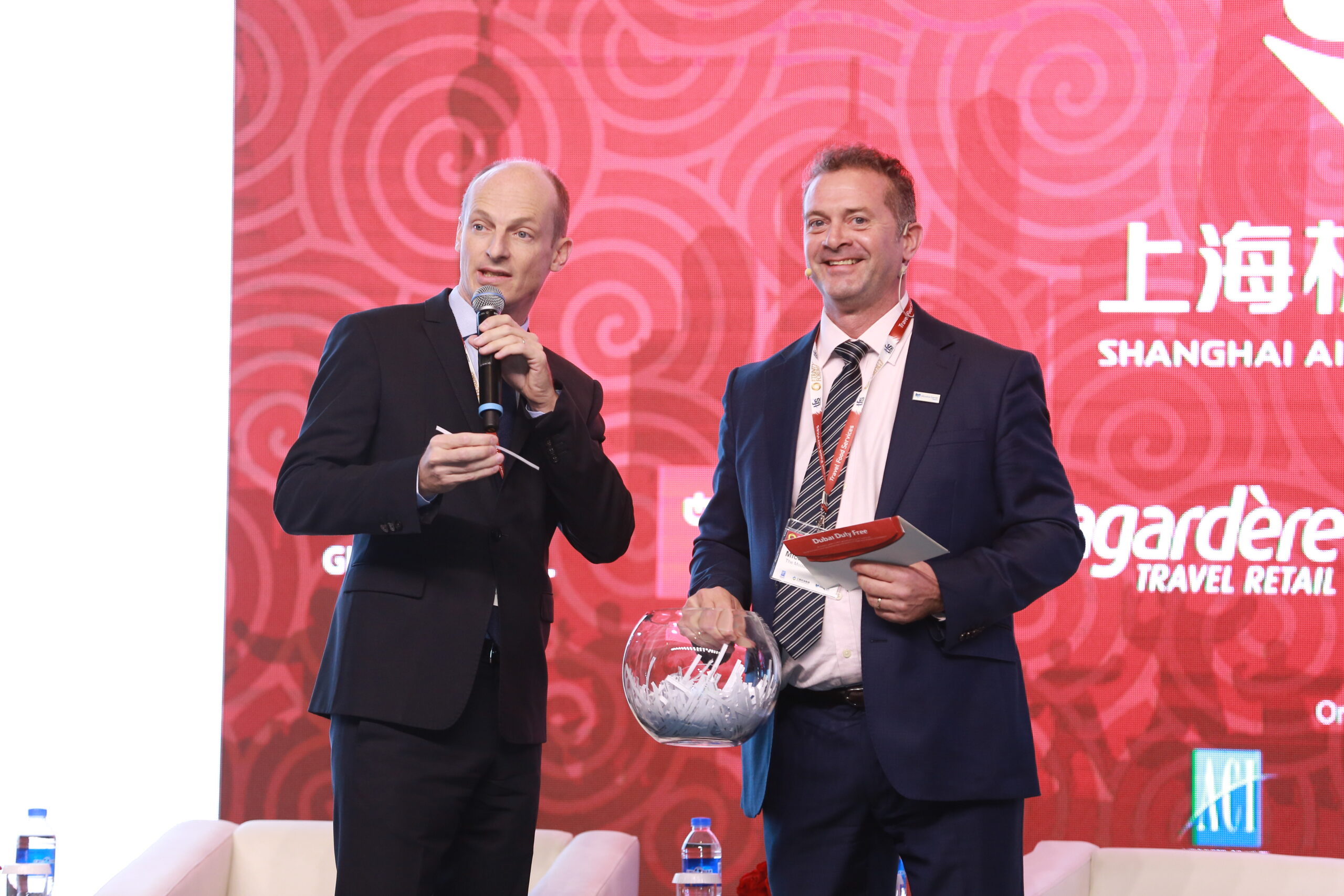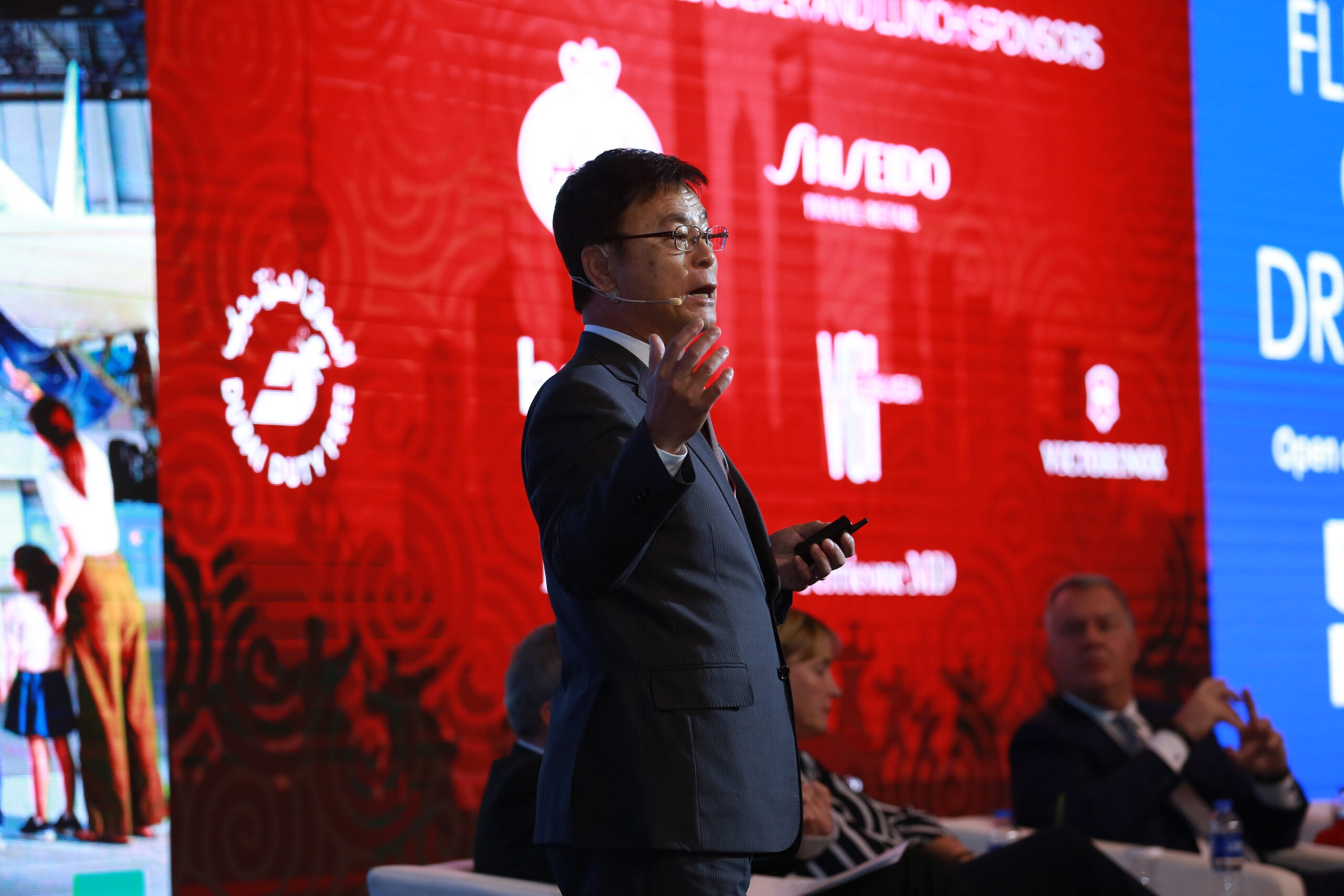CHINA. The second day of The Trinity Forum 2018 was firmly focused on the realities and the future of the travel retail industry.
The Moodie Davitt Report Founder & Chairman Martin Moodie kicked off with a show of appreciation to Shanghai Airport Authority for its hosting of the Opening Cocktail (with added sponsorship by Lagardère Travel Retail and wines & spirits courtesy of Diageo Global Travel) and a thank you to delegates for the strong turnout early on Day Two. The conference room at the Jing An Shangri-La hotel in Shanghai was packed, as it was for much of the two days.
The day’s first panel was titled ‘Towards a new retail and a new consumer experience’. Four speakers from four different areas of the industry came together to share their own approaches to dynamic disruption.

Budapest Airport Head of Retail & Advertising Dr. Patrick Bohl gave the first address, which discussed the airport’s enterprising BARTA (Brand, Airline, Retailer, Technology, Airport) campaign with partners Wizz Air and Gebr Heinemann, explaining that results had “exceeded expectations”.
Across Europe, passengers may be spending less, but the industry cannot lay all the blame on e-commerce, he argued. It instead needs to be more engaging to draw customers in. Bohl recognised this was a difficult challenge that required heavy investment, and he noted the tough competition from players outside of the travel channel. “But it can be done,” he stressed.

A three-month promotional partnership launched by Budapest Airport and key partners, the BARTA campaign ran from March to April this year. Any departing Wizz Air passenger spending over €50 or €75 at Heinemann Duty Free stores received a €4.50 or €7.50 voucher to spend onboard the airline. Bohl said the campaign saw a 77% redemption rate without cannibalising sales elsewhere.
So successful was BARTA, in fact, that it is launching again from 1 November, with an added emphasis on the crucial pre-order element.

AOE Chief Executive Officer Kian Gould asked how businesses can transform themselves to adapt to a new world and how can technology help drive travel retail?
Addressing what he called the “myth” that travel retail transactions are dominated by impulse purchases, Gould cited research that said 81% of airport purchases are now planned in advance (in China, the figure was 89%). The industry needs to use digital to help customers pre-plan their spend, argued Gould.
Spend per passenger is declining in travel retail, yet the same customers are high spenders in other channels, so we must – as an industry – find a way to encourage them to spend with us too, he said.
AOE provides e-commerce platforms for airports, with a notable example being Heathrow Boutique. This site complements and supports rather than replacing the airport’s physical retail. “Digital won’t replace the physical,” concluded Gould. “But it is where the future lies.”


Auckland Airport Omnichannel Manager Jayne Wear took to the stage to explain the airport’s targeted and innovative approach to travel retail.
The next generation of travellers are shopping very differently, she said. Modern shoppers will consume up to five different kinds of content before making a purchasing decision.
How is Auckland Airport addressing this? By “offering a cross-channel and connected experience”. Passengers can browse the retail offerings and even make a purchase before they get to the airport, then pick up the order when they arrive.
The important thing, said Wear, is to experiment – and not be afraid to fail along the way.
The final speaker of this panel was AirAsia Deputy Group CEO (Digital, Transformation and Corporate Services) Aireen Omar, who also spoke of the need for a seamless omni-channel customer experience. AirAsia, she said, was born in the internet age and it serves the customer of the internet age. “We were an airline; now we are a technology company,” she said pointedly.

The second panel of the day was entitled ‘Big Data: a driving force for the future of travel retail’.
Moodie Insights General Manager Craig Mackie and m1nd-set CEO & owner Peter Mohn discussed the ways in which analytics and artificial intelligence (AI) can help drive sales.
Mackie began with an exploration of the ways the industry should approach data. It needs to be more demanding and more agile, he said.

We need to understand the reasons behind purchase. “What are the underlying shopper motivations?” he asked. From gifting to self-indulgence to fuel for the journey, the motivations are as important as the products bought.
AI and machine learning allow us to collect data more efficiently and dynamically than ever before, Mackie continued. In travel retail, unlike in domestic retail, customers will come through and make multiple purchases in one session. And we are able to track their total customer journey.

The most important thing to consider, in Mackie’s opinion, is to be able to interpret and use this information in a dynamic and agile manner. “We need to take big data beyond just the hands of data scientists,” he said.
Peter Mohn then introduced The Data Circle, a joint venture launched in September by The Moodie Davitt Report, Generation Research and m1nd-set.

The Data Circle, explained Mohn, asks the question, what does our data mean? It aims to help the industry translate big data into usable and actionable information. It’s “understanding the big picture by connecting the dots”, he said.
The Moodie Davitt Report President Dermot Davitt next welcomed to the stage Lagardère Travel Retail Chairman & Chief Executive Officer Dag Rasmussen.
Rasmussen explained to the audience some of the ways in which the retailer is dealing with the changing airport and travel retail commercial ecosystem. These include a reassessment of customer profiles, a change in retail offer, and a new approach to digital: using technology to communicate with customers in novel and creative ways.

He went on to discuss the importance of the company’s operations in China. “We believe, as do many others, that the Chinese population is the driving force of travel retail,” he said. 2017 saw sales reach €4.7 billion in the country, where Lagardère Travel Retail has had a presence for 15 years. In China today, said Rasmussen, “we are the largest international travel retail operator,” with 250 stores and restaurants and a presence in 15 airports and 30 railway stations.
Rasmussen next explained that travel retail, at least for Lagardère, is no longer only about product category. It’s about the reasons behind the purchase and how the customer connects to the product.
Convenience, ‘localness’ and authenticity, gifting, experience: categories of this type are more important than traditional product categories, says Rasmussen. In some of Lagardère’s platforms, he added, local products make up 40-45% of sales.
This approach informs the operator’s ongoing strategy, which will increasingly focus on digitalisation to facilitate customer engagement.

Decreasing spend per passenger is a reality, said Rasmussen, who believes it is inevitable that it will even hit China at some point. We have to address it, he added.
Lagardère proposes a new business model to address the changing climate; it focuses on flexibility in contracts and a new bidding structure.
Finally, he noted the importance of environmental awareness and the quest for sustainability. The industry’s carbon footprint “is an issue… but that’s why we have to try harder than others” on issues such as recycling and local produce, he said. The key factor is to compensate for our environmental impact.

During the morning coffee break, a special draw was held in which two lucky delegates won entry to the Dubai Duty Free Millennium Millionaire promotion.
On stage was one of last year’s winners, Emmanuel Goulin, who went on to win the Millennium Millionaire luxury car draw and – in a move of impressive generosity – sold his Porsche and donated the profits to two industry-supported charities.
This year’s Dubai Duty Free draw winners were Paul Loo Lip Giam from Focus Network Agencies and Yik Ching Lee from Arte Madrid.

The Moodie Davitt Report’s Michael Barrett interviewed Airport Council International (ACI) ASQ Associate Director Dimitri Coll in a section titled ‘Benchmarking Commercial Excellence’.
Coll introduced the new ASQ (Airport Service Quality) Commercial survey from ACI, which provides insights into commercial performance and how airports can optimise non-aeronautical revenues.
Key themes discussed were: Why is customer experience so important? How and why does it impact sales? And how can we improve it?
Mars International Travel Retail General Manager Gary Clarke, who discussed the company’s ‘big picture’ perspective for the future.
Mars has always acknowledged the need to balance profit with principles, he said, but the importance of principles in business is, today, keener than ever before.
Lengthy research, said Clarke, has seen a shift in strategy, with focus shifting towards the larger ecosystem, rather than simply on profits. Responsibility to both the community and the planet are more important than ever before, he stressed.

This is something that today’s educated consumer is increasingly coming to expect from the brands it buys into, he explained. “It is important to note that this is not a CSR programme. It’s a new and holistic approach to business.”
Altria International General Manager Michael Simon showed delegates his concept for the future of the tobacco category in travel retail.
He highlighted the advantages of the tobacco category: huge footfall; a uniquely captive audience; and relatively high savings.
However, he warned of the dangers of complacency and relying on “conventional wisdom” – in particular, the idea that duty free is driven by impulse purchases.

How can tobacco see growth as a category then? Experiential retail – a sense of theatre in duty free – is an important tool, as are travel retail-exclusive products, he said.
The morning concluded with the ‘Destination 2030’ panel, which considered the next stops on the travel retail journey. Where will we be in 12 years’ time?

Shanghai Airport Authority Vice President Ruijun Jia expressed a desire to work together to create a “win-win future” for all industry players.
His presentation focused on the following questions: How will the business be affected in the future, what will be the key disruptors, and what plans does Shanghai Airport Authority have to address these changes?
Japan Airport Terminal Company Executive Vice President and Chief Operations Director Hiroshi Onishi considered the future of the airport retail business.
The airport, he said, can be seen as a large-scale shopping centre that also functions as a town. But are we maximising on its potential? Are we doing enough to engage visitors?
Not universally, said Onishi. “We must introduce new content that the modern customer wants.”

“The world is certainly going to be a very different place in 2030,” said Furla Global Travel Retail Director Gerry Munday. Will global travel retail still be a showcase for brands?
She suggested that successful brands will be those who use predictive analytics to tailor their offerings to customers. For example, using virtual and digital engagement to enable consumers to ‘try on’ various outfits in their homes or to pre-select bespoke items visiting the stores to collect or make final choices.

However, said Munday, a change in the lease structures between landlord and retailer/brand will also be “a crucial element of success” in the future of travel retail.
She also noted the changing nature and function of the physical retail store, suggesting that – in order to survive – airport retail spaces need to become more like showrooms than traditional shops.
After lunch the powerhouse line-up continued. A Trinity Panel came together to discuss the future of the airport commercial offer.

Manchester Airports Group (MAG) Executive Vice President Business Development & Lounges Beth Brewster started the afternoon’s first panel with a discussion of the lounge market.
Lounges, said Brewster, offer an opportunity to reach and communicate with travellers to inform them of airport services before they arrive.
“This is an incremental industry,” she said, citing MAG findings that lounges do not cannibalise profits from F&B outlets.
They also offer the airport a great way to gather data about their passengers, she added.


Greater Toronto Airports Authority Vice President Customer & Terminal Services Scott Collier revisited a topic he spoke on at last year’s event: the importance of collaboration between various partners at the airport.
Last year, Collier made a call to action, inviting brands to visit Toronto to see how they could work together towards a more innovative future.
Trinity, and the spirit of Trinity, he said, taught his company “so much, and the spirit of collaboration continues to inspire”.

Central Japan International Airport Co President & CEO Masanao Tomozoe shared his company’s vision of the future.
Championing excellent customer service and a people first approach, the airport’s focus will be on engaging experiences – in retail and beyond – and creating Sense of Place.
“We have been doing lots of crazy things to attract as many people as possible”, laughed Tomozoe, as he shared photos of activations featuring characters such as Pikachu and Hello Kitty.
Shiseido Travel Retail Asia Pacific General Manager Kenji Calméjane’s contribution to the Trinity Panel considered the impact of digital retail and communications on the industry.
Giving the all-important brand perspective on the subject, Calméjane began by noting that while disruption was the subject of the week, he believes airports are dynamic and engaging spaces already.

How, though, can the industry strive forward? How can it fight back against the threat of online retailers? “It’s not an issue of physical retail,” he said. “The problem is bad physical retail.”
One contributor to future success will be the ability to harness the ‘Connected Journey’, he said.
Calméjane added that “data silence” was a threat to the industry. Let’s collaborate, let’s try, he said. This was a resounding theme of the conference.
‘The Storytelling Experience’ was Calméjane’s next topic. “I think the beauty category has raised its game,” he said, referencing the bold and experiential activations that have recently graced travel retail beauty stores and spaces.
In conclusion, Calméjane asked delegates to consider the idea of collaboration. It will benefit everyone involved, he urged.

VGI Global Media Airports Chief Operating Officer Jonathan Goldsmid was the last speaker to give his views on ‘reimagining the airport commercial offer’.
Airport advertising, he said, is an increasingly important element of airport life and revenue. Advertising, and in particular OOH/airport advertising, is actually a highly digitalised and innovative medium these days.
Again the audience was urged to embrace a partnership model to create a seamless passenger experience. Goldsmid was critical of the status quo. “We have to explore new ways to partner,” he said. “We need to be prepared to fail in the pursuit of growth.”

Next, The Boston Consulting Group China Partner and Managing Director Angela Wang shared the results of a recent joint research project with Tencent in the first address of a panel on ‘The shape of consumer engagement, luxury and beauty retail to come’.
Some 3,000 consumers were surveyed in order to gain an understanding of the purchasing paths of new generation Chinese consumers.
While few need reminding of the importance of the Chinese shopper, the results of this survey were nonetheless impressive. These consumers are young and getting younger, they’re educated – and educated about brands and retail, and they’re “fantastically technically minded”, Wang said. And by 2024, they will account for 40% of the global luxury market.
The modern Chinese consumer may be glued to their mobile phone most of the time, said Wang, but they still like to shop in person. ROPO (research online, purchase offline) is a serious phenomenon among this demographic.
Therefore, she said, the importance of brand awareness – built through successful digital campaigns and the like – is paramount. Whether Chinese customers are buying at home or abroad, they rarely make a purchase from a brand they haven’t already explored and learned about.

Jessica’s Secret founder, Chairman & CEO Mirko Wang joked that The Trinity Forum has just made him aware of his own fame. [The company has been a common topic of conversation among delegates.]
When he founded his price comparison app in 2015, little did he think that three years later the platform would have 80,000 users, he said.
Comparing prices in duty free is just one element of the app, which also looks at domestic and online prices, and even tells customers the different amounts they’ll pay depending on payment method.
Wang has successfully captured the Chinese shopper. What tips does he have for those who want to do the same?
Wang suggested that a lot of foreign companies over-complicate their campaigns in China and fail to ensure the basics are done well.
From failing to recognise the enormous diversity of the Chinese population (and failing to choose a specific subgroup to target), to ignoring the basic marketing tools and rules of the nation, Wang said that brands simply cannot overestimate the dangers of failing to adapt to the market.
“China changes every day,” he said. “Even the Chinese cannot keep the pace.”

Jing Daily & Jing Travel Associate Editor Yiling Pan considered new trends among Chinese travellers and luxury consumers when travelling.
To really capture the Millennial and Gen Z consumers in China, Pan believes experiential luxury is an absolute must. She spoke of “tech-enabled human interaction” as a powerful tool of the future.
Studies show, she said, that “relaxed and positive” consumers spend more. Experiential retail creates this feeling. And, of course, this consumer is already a big spender.
“The young Chinese consumer, particularly females, is truly buying into all kinds of luxury and beauty products.”
iClick Interactive (Asia) Chief Product Officer Yan Lee shared details of a white paper on Chinese travellers and luxury shoppers (compiled in conjunction with The Moodie Davitt Report).
Points of particular note include:
- Citizens from lower tier Chinese cities are now more likely to spend abroad than to spend in Tier 1 cities.
- Only 8% of Chinese citizens own passports, though this figure is expected to grow.
- By 2025, Chinese consumers are expected to account for 44% of global luxury spending. Around two thirds of this will probably be done outside of China.
- These consumers wish to be seen as cool and individual, and they crave newness.
China is huge, said Lee. You cannot aim at targeting the nation as a whole. Target those groups that are relevant to you.

With the conference at an end, delegates headed for the Gala Dinner, graciously hosted by Shanghai Airport Authority. The authority’s President, Xin Feng, gave a welcome speech and reminded attendees of the power and potential of the Chinese travel business.
After a stunning display by local performers, guests were treated to a generous dinner aboard a striking river cruise ship, offering a magnificent evening view of Shanghai from the water.












